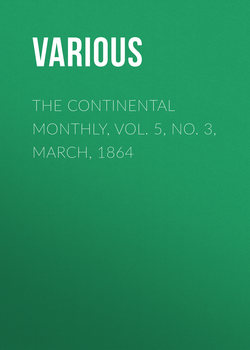The Continental Monthly, Vol. 5, No. 3, March, 1864

Реклама. ООО «ЛитРес», ИНН: 7719571260.
Оглавление
Various. The Continental Monthly, Vol. 5, No. 3, March, 1864
AMERICAN FINANCES AND RESOURCES
LETTER NO. III. OF HON. ROBERT J. WALKER
PALMER, THE AMERICAN SCULPTOR
CLOUDS
SKETCHES OF AMERICAN LIFE AND SCENERY
II.—THE CATSKILL MOUNTAINS
THE ISSUES OF THE WAR
ÆNONE: A TALE OF SLAVE LIFE IN ROME
CHAPTER I
CHAPTER II
CARL FRIEDRICH NEUMANN, THE GERMAN HISTORIAN OF OUR COUNTRY
THE GREAT AMERICAN CRISIS
PART THREE
THISTLE-DOWN
THE LOVE LUCIFER
CHAPTER I
AMERICAN FINANCES AND RESOURCES
LETTER NO. IV. OF HON. ROBERT J. WALKER
WAS HE SUCCESSFUL?
PART THE LAST
CHAPTER VI
CHAPTER VII
CHAPTER VIII
CHAPTER IX
THE MECHANICAL TENDENCY IN MODERN SOCIETY
AN INDIAN LOVE-SONG
LITERARY NOTICES
EDITOR'S TABLE. THE METROPOLITAN FAIR IN AID OF THE UNITED STATES SANITARY COMMISSION
Отрывок из книги
It is generally believed, even when the American rebellion should be suppressed, that there would be a great loss of wealth and resources on the part of the United States. As an economical question the great truth is not disputed by me, that, as a general rule, wars by a waste of property, by large expenditures, and by the withdrawal of so much labor from the pursuits of industry, impair the material interests of the nation. The influence of such considerations in the United States is not denied; but there are in the cause of this contest, as well as in its effects and consequences, results which will more than compensate for such losses. Slavery was the sole cause of this rebellion, and the result will be the reconstruction of the Union, with slavery everywhere extinguished. On this assumption, the question is, whether the substitution of free for slave labor throughout every State and Territory of the Union will not, as a question of augmented wealth and invigorated industry, far more than compensate for the losses incurred in the contest. Reasoning inductively, it might well be supposed that the willing labor of educated and energetic freemen would be far more productive than the forced labor of ignorant, unwilling, and uneducated slaves. In the realm of science, as well as in the direction of labor, knowledge is power, education is wealth and progress; and that this is applicable to the masses who compose a community, and especially to the working classes, is demonstrated by our American official Census. In proof of this position, I will proceed by a reference to the official tables of our Census of 1860, to show not only in particular Slave States, as compared with other Free States, whether old or new, Eastern or Western, or making the comparison of the aggregate of all the Slave with the Free States, the annual product of the latter per capita is more than double that of the Slave States. I begin with Maryland as compared with Massachusetts, because Maryland, in proportion to her area, has greater natural advantages than any one of the Slave or Free States; and if the comparison with the Free States is most unfavorable to her, it will be more so as to any other Southern State; as the Census shows that, from 1790 to 1860, as well as from 1850 to 1860, Maryland increased in population per square mile more rapidly than any other slaveholding State.
We must consider the area, soil, climate, mines, hydraulic power, location, shore line, bays, sounds, and rivers, and such other causes as affect the advance of wealth and population.
.....
Some of these tables are given as follows:
First, as to Railroads.—The number of miles in Massachusetts in 1860 (including city roads) was 1,340, and the cost of construction $61,857,203. (Table 38, pp. 230, 231.) The value of the freight of these roads in 1860 was $500,524,201. (P. 105.) The number of miles of railroad in Maryland at the same time was 380, the cost of construction $21,387,157, and the value of the freight (at the same average rate) $141,111,348, and the difference in favor of Massachusetts $359,412,883. The difference must have been much greater, because a much larger portion of the freight in Massachusetts consisted of domestic manufactures, worth $250 per ton, which is $100 a ton above the average value.
.....